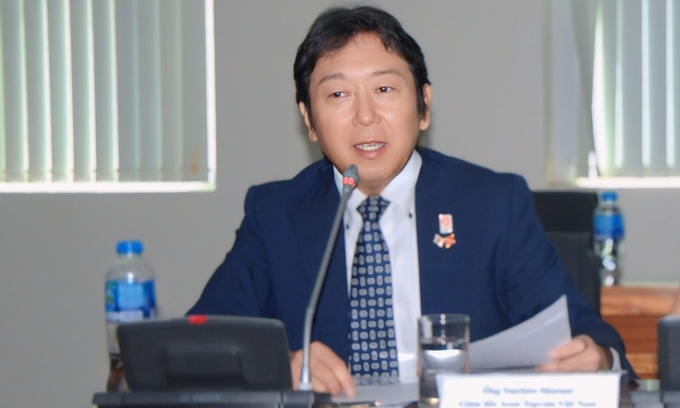November 19, 2025 | 11:30 GMT +7
November 19, 2025 | 11:30 GMT +7
Hotline: 0913.378.918
November 19, 2025 | 11:30 GMT +7
Hotline: 0913.378.918

Mr. Yuichiro Shiotani, General Director of AEON Topvalu Vietnam Co., Ltd. Photo: Thi Ha.
The information was shared by Mr. Yuichiro Shiotani, General Director of AEON Topvalu Vietnam Co., Ltd., in the seminar "Connecting the International Goods Supply Chain 2024" organized by the Ministry of Industry and Trade on April 12.
According to Mr. Shiotani, this group brought fresh Vietnamese bananas to 91 supermarket selling points in Hong Kong last year. 100% of fresh bananas on sale are imported from Vietnam, while previously, this product was provided by suppliers in the Philippines, Taiwan, or Singapore.
The reason why the group chooses Vietnamese products is due to high quality. Banana production in Vietnam applies a circular economy. The production enterprise does not generate external waste during the growing and processing process. "This process meets the group's sustainability criteria," said Mr. Shiotani.
In addition to bananas, AEON will purchase fresh mangoes 100% from Vietnam instead of Thailand and the Philippines. It is expected that banana output will double compared to 2023.
According to Japanese retailers, buyers have raised their criteria regarding the current consumer trend. In addition to price, the product must be environmentally friendly and have fast delivery.
Similarly, Mr. Mirash Basheer, Director of MAY Exports Vietnam, Division of LuLu Group International, a large buyer of India, said that the demand for purchasing products from Vietnam is increasing, especially those that meet green criteria.
The company also plans to buy more shelled cashew products and work directly with factories. In addition, the group also looks for products that are Vietnam's strengths, such as canned fruit juice, coconut water, cashew nuts, canned tuna, etc., to position Vietnamese products in the segment higher.
For the US market, a representative of the Walmart supermarket system said that there are about 500 businesses supplying goods to supermarkets. However, most are FDI enterprises, while purely Vietnamese companies account for a small proportion and are mainly secondary suppliers. If Vietnamese businesses have quality products that meet sustainable development criteria, reaching consumers in the US will be easier.
According to Mr. Do Ngoc Hung, Vietnam Trade Counselor in the US, businesses need to learn about distributors' criteria carefully. Typically, Walmart, Costco, and Amazon are all consumer-centric. They emphasize strict factors on the quality and price of goods. Especially controlling input quality, ensuring green criteria, environmental responsibility, and labor.
Businesses need to build a supply chain from wholesale to retail successfully. In addition, companies can coordinate with state industry associations, distributors, and promotion agencies to participate in exhibitions and fairs and expand connections. Participating in the "Vietnam International Sourcing 2023" event on June 6-8 in Ho Chi Minh City is also a way for businesses to shake hands with distributors.
Translated by Huong Giang

(VAN) Deputy Prime Minister Tran Hong Ha convened a meeting with the MAE and relevant agencies to discuss the draft decree on national multidimensional poverty standards for the 2026 - 2030 period.

(VAN) The year 2025 marks the 10th anniversary since more than 190 countries adopted the Paris Agreement on climate change, paving the way for strengthened global action.

(VAN) The PepsiCo Foundation funded the project ‘New Harvest: Sustainable Agriculture Initiative’, focusing on regenerative agriculture and climate change.

(VAN) Dr. Nguyen Viet Hung, ILRI's Regional Director for Asia, emphasized the One Health approach in ensuring food safety and reducing antimicrobial resistance risks in livestock.

(VAN) The youth-driven initiative ‘Innovate for water, act for the future’ seeks practical, scalable solutions to Vietnam’s water challenges.

(VAN) At the Annual Science Conference of Thuyloi University, Deputy Minister Phung Duc Tien directed researchers to focus on in-depth studies, data harmonization, and solutions linked to real-world practice.

(VAN) After nearly four years of implementation, 5,187 community agricultural extension groups have been established nationwide, with 47,493 members participating.